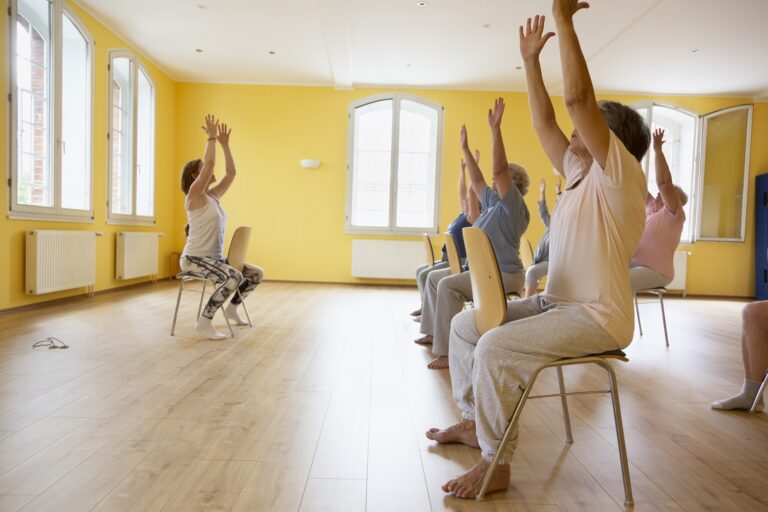8 activities to keep your brain sharp
It’s comforting to know that significant memory loss is not a normal part of getting older, and there are several things you can do to stop that from happening.

Lost keys, a missed appointment, a word on the tip of your tongue, walking into a room and not remembering why. Sound familiar?
It’s a fact of life that sometimes we forget things, no matter our age. But as we get older, our brain’s capacity to hold memory gradually shrinks. When this occurs, nerve cells in our brain can lose connections with one another and blood flow can slow, resulting in some changes to our cognitive function as we age. However, it’s comforting to know that significant memory loss is not a normal part of getting older, and there are several things you can do to stop that from happening.
Here are eight activities to keep your brain sharp:
1. Learn something new
According to Alzheimer's Association, a higher level of education is associated with better mental functioning in old age. The theory is that people with more years of formal learning have built up “cognitive reserve”, which is the brain’s ability to use connections between nerve cells.
While for most of us, the opportunity for higher education may be long gone, it’s never too late to learn something new. Challenging your brain with mental exercise is believed to activate processes that help maintain individual brain cells and stimulate communication among them.
Learn an IT skill such as how to use Instagram or call friends and family using video chat; join a book group, play chess or bridge, learn a new language, write your life story, do crosswords, Sudoku or jigsaw puzzles, take a class, pursue music or art or design a new garden layout.
2. Use all your senses
Have you ever smelt a distinct smell, and been instantly transported back to a long-forgotten summer in Europe, or been reminded of a particularly wonderful meal? It’s because the regions in our brain that juggle smells, memories and emotions are very much intertwined.
Music can also be a strong trigger for memory. A series of recent studies have found that listening to music engages broad neural networks in the brain, including brain regions responsible for motor actions, emotions, and creativity.
So how can we use this phenomena to help keep our brain active? Try challenging all your senses when you try something new. Try to guess the ingredients as you smell and taste a new food. And, play some music while you do it – music is based on relationships between one note and the next, so while you may not be aware of it, your brain has to do a lot of computing to make sense of it.


3. Stay physically active
Regular physical activity is thought to help maintain blood flow to the brain and reduce your risk for conditions such as high blood pressure and dementia.
More indirectly, exercise improves mood and sleep, and can help reduce stress and anxiety – both of which can be a contributing factor to cognitive impairment.
Experts recommend starting with 30 minutes of physical activity each day. Low impact exercises are often a good place to start, and can include things like a brisk walk, swimming, gardening and yoga. You'll not only feel better, but you'll also be keeping your brain active, improving your mental health, and reducing your risk of developing Alzheimer's disease and other illnesses.
Before getting started with a new exercise routine, it’s important to always consult your GP. Remember to start your exercises slowly and don’t push yourself too hard.
4. Eat a healthy diet
This one almost goes without saying – eating well helps overall body function and improves our brain health.
Accredited practising dietitian and spokesperson for the Dietitians Association of Australia Joel Feren emphasises the need to take a holistic and well-rounded approach to nutrition and places importance on incorporating the five core food groups into our diet every day.
The Australian Guide to Healthy Eating spells out those five food groups:
- Meat, fish and other seafood, poultry, eggs, nuts and legumes
- Milk, yoghurt, cheese, custard and ice cream
- Bread, cereals, rice, pasta and noodles
- Vegetables
- Fruits
Eating a healthy diet helps control blood pressure and cholesterol, and also improves cognitive function. Vitamin E, B and omega-3 fatty acids have been linked to reducing a person's risk of developing dementia, and other foods such as green leafy vegetables, berries, and seafood are neuroprotective, meaning they protect nerve cells against damage.
5. Declutter your mind
Just like a messy house, it can be hard to make space in a cluttered mind for new things. So, use memory aids to clear some space – things like calendars, planners, shopping list, files and address books.
Create a special place at home for your glasses, purse or wallet, keys, and other items you use often so you always know where they are. If you don't need to use mental energy remembering where you laid your keys or the time of your granddaughter's birthday party, you'll be better able to concentrate on learning and remembering new and important things.
6. Use brain-training techniques to improve memory
Thanks to decades of research, there are various strategies we can use to protect and sharpen our minds. So, the next time you need to remember a new friend’s name or a handful of things you need at the supermarket, try one of these three techniques:
- Repeat it – If you've just been told someone's name, use it when you speak with him or her: "So, John, where did you meet Mary?" If you place one of your belongings somewhere other than its usual spot, tell yourself out loud what you've done.
- Revisit it – If high school taught us anything, it’s that cramming doesn’t work. Instead, if you learned something a while ago that you want to remember in the long run, re-study it in spaced intervals. So, read it today, tomorrow, the day after tomorrow, and then again after a week. Revisiting information helps you to remember it more easily.
Make a mnemonic – This is a creative way to remember lists. North, South, East, West becomes Never Eat Soggy Weet-bix. Or how about the name Roy G. Biv to remember the colours of the rainbow? You could try making one up next time you need those few things at the supermarket. It could even be something like I Really Don’t Like Shopping, which could stand for icing sugar, rice, detergent, lemons and sausages.
7. Socialise
Making new friends or spending time with the ones you have might be good for your brain health.
A 2018 study published in Scientific Reports that looked at older adults in China found that participants with consistently high or increased social engagement had a lower risk of dementia than those with consistently low social engagement.
So, even the simplest of tasks such as having a cuppa with a friend or catching up with family could improve your cognitive skills and help improve your overall brain health.
Learn how to make and maintain social connections.
8. Believe in yourself
Ever heard the saying “it’s all in the mind”? Negative stereotypes around ageing and memory contribute strongly to older people seeing themselves in the same way and losing the motivation to take active steps to stay sharp, as they believe they’re a ‘lost cause’.
People who believe that they are not in control of their memory function are less likely to work at maintaining or improving their memory skills and therefore are more likely to experience cognitive decline.
If you believe you can improve and you translate that belief into practice, you have a better chance of keeping your mind sharp.
In summary, it’s never too late to start sharpening your brain. Just a few minutes a day on any of the above activities can help your mind stay active and support your overall brain health.

Stay active in retirement
IRT has been building retirement villages for more than 50 years. We have more than 30 retirement villages in NSW, Qld and the ACT. Living independently in a community is a great way to stay active with various lifestyle activities on offer.
Find out moreYou may also like
How to take care of ageing parents
As our parents get older, even if they are completely independent, it’s possible they will need help with some tasks.
Downsizing your home for retirement: where to begin
Have you been thinking about downsizing your home? We help you make sense of this life-changing decision that can reap so many benefits as you…


